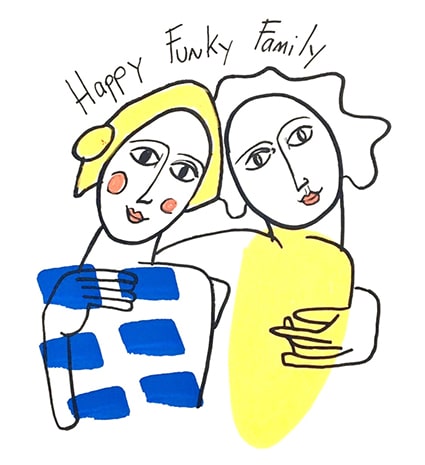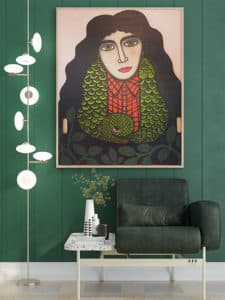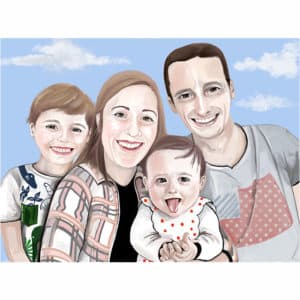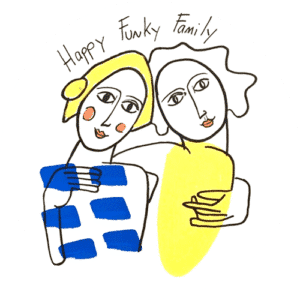
Does art make us happy?
In the Happy Funky Family, we are convinced that art makes you happy and that our commissioned portraits provide an unbeatable emotion.
Is this a figment of the imagination or are we right? Can art really help us to reach that state of serenity and lasting fulfilment that we call HAPPINESS?
We were “happy” to look into the matter!
By Nathalie Boscq, Co-founder of the Happy Funky Family

- The childhood of art…
At first sight, art would make us happy, because we can enjoy it. It makes us happy on all levels: socially, psychologically, existentially and deeply. Yes, art makes us happy, it is even its duty, at least what we look for and need it for.
Who would go and quench their thirst for art while hurting themselves?
On the contrary, art allows us to meet people who are just as passionate as we are and sometimes just as strange and incomprehensible, but who make us happy. These informal encounters with artists, these people who step out of the lines drawn to denounce injustice or simply to put life back into the hearts of those who have nothing left. Yes, because when we no longer have anything to tie us to life, only art has the capacity to raise us to the highest level of ourselves to transcend us and make us taste a moment of eternity.
It is in order to remain psychically stronger that art comes to lift us up, because we choose the art we want to love. The human being has this capacity of choice, he wants his happiness, he chooses the way without forgetting to be surprised. Our existence is thus irradiated with the rays of art and in us, this long-awaited and sought-after happiness finds its fulfilment. It is what we do with art that makes us happy.
Portrait by our painter Juliette
- Art as a vehicle for emotions
Feel good” novels, “good mood” films, music that “boosts” or “gives you a boost”, many works of art undoubtedly give us pleasure. Remember the feeling of being on cloud nine after seeing “Le Fabuleux Destin d’Amélie Poulain”… It is difficult to say that art makes us happy, since happiness depends on a large number of variables, but even if it does not make us happy for sure, it contributes to it! “Experiencing this kind of satisfaction can contribute to happiness. We can certainly link this pleasure to certain conceptions of happiness or human accomplishment in our tradition of thought,” explains Danielle Lories, professor of psychology at the University of Geneva. Danielle Lories, professor of philosophy and philosophical aesthetics at the Catholic University of Louvain (UCL), explains.
When we look at a painting, a sculpture or listen to music, we secrete dopamine, the pleasure hormone and desire. Art frees our brains from reality and gives us the opportunity for more happiness.
You shiver when you listen to the opera, you smile in spite of yourself at the theatre, your body feels and reacts, sensitive to positive emotions. The mind, too, is enriched by the ideas and stories. “There has never really been a separation in our tradition of thinking about the pleasure of both body and mind,” says Danielle Lories.
Art has an impact on the body, undeniably. And while we are still in the early stages of scientific understanding of the effects of art, studies to date show that looking at a work of art, or creating one, helps us connect more easily to our emotions, and suggests the possibility of connecting better with others.
Portrait of friends by our artist Pamela
- Art helps us to live together
While art can give pleasure and help us to live better by managing our emotions, it can also teach us about human nature and relationships. The moments shared at the cinema, during a concert or a play bring well-being and positive feelings. The communion of spectators can also, in a certain emotional and intellectual state of mind, have beneficial effects on relationships between people in society,” adds Danielle Lories. We might find something there that brings us closer to human happiness, in the sense of the fulfilment that would be living with others.”
Moreover, Art is meant to be be lived togetherto be shared in the community. The public of an exhibition or an artistic event likes to confront its points of view and interpretations of the same work, likes to seek together to interpret and understand what an artist wanted to express. The most important thing is not so much to like what you have seen, but to have felt an authentic emotion in front of the work. The word “aesthetic” comes from the Greek aïsthésis, which means “sensation”.
Art is also a revelation of our humanity. It allows us to better understand ourselves and others. Art has no country of origin, art has no religion, art is universal. It brings together and unites men and women from all over the world…. Indeed, no need to know a foreign language to decipher, interpret and appropriate a work of art. It speaks for itself.
- Art, revealing the beauty of the world
“Art does not reproduce the visible, it makes it visible. Paul Klee.
Artists are revelators, they help us to see the world differently, they take us away from the utilitarian view of the world. The interest of art is the possibility to get out of one’s own mind… Art sharpens our perception, allows us to have a more contemplative and less utilitarian relationship with the world! We can therefore say that it contributes to our happiness.
Oscar Wilde said “you can only see a thing when you see its beauty…”. Art reveals the beauty of things and it is not art that imitates life, it is life that imitates art!!!
Family portrait by our artist Carole
- Art, the new happy pill?
Matisse, Monet or Kandinsky, twice a week. And all with a prescription! Since this winter, in Montreal, going to the museum can be prescribed by your doctor. The idea behind the museum prescription program, which is the result of an agreement between the organization Médecins francophones du Canada and the Montreal Museum of Fine Arts (MMFA), is to allow patients and their caregivers to enjoy the health benefits of art free of charge. “A century ago, people were not convinced that sport was good for their health. We are in the same situation today with works of art,” says Nathalie Bondil, Director and Chief Curator of the Montreal Museum of Fine Arts (MMFA). The museum’s motto sums up the approach: “Art does good. But it can also heal. No doubt about it! For the past thirty years in France, many health structures have shared this observation with art therapy, which is still little known. By using all forms of art (for example drawing for the youngest, photography and video for the elderly), art therapy improves the patient’s mood, allows him or her to reduce the dose of medication, and reduces convalescence. But what actually happens in our brain? How does art affect our health?
Jean-Pierre Changeux, neurobiologist and professor at the Collège de France, was the first to decipher the neural mechanisms involved in the appreciation of beauty (Du vrai, du beau, du bienOdile Jacob). The contemplation of a work of art functions as a reward. “Beauty is essential to the human being because it makes us feel good,” the specialist reminds us.
Some scientific studies tend to show that art is an indispensable support for the proper development of our brain. According to Pierre Lemarquis, the benefits of art have been known for thousands of years because it acts like a medicine.
Art contributes, by practising it, to the triggering of the famous hormone dopamine, which is the hormone of reward, as explained by Jean-Pierre Changeux, neurobiologist and professor at the Collège de France.
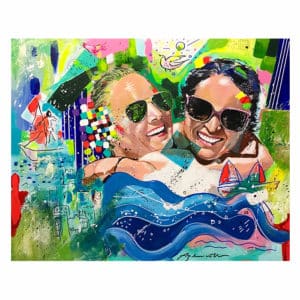
- Art awakens our empathy
According to Plato, “the first good is health, the second is beauty” (Laws II, 22). Neuroscience studies in recent years have confirmed the intuitions of the ancient philosophers: looking at a work of art, playing music, has direct effects on our brain. For Pierre Lemarquis, a neurologist, it is as if ” art caresses our brain “. His book, Portrait du cerveau en artiste, explains that contemplating a work of art stimulates the frontal cortex, the seat of reason (when we try to understand a contemporary art installation, for example). If we like it, our brain increases the brightness, contrast and colours to enjoy it fully. Very quickly, we awaken our mirror neurons, i.e. our empathy neurons. Even more surprisingly, the bilateral fusiform gyrus is also activated. This is the area involved in face recognition: we see a beautiful painting as we see a loved one! All this has an impact on our health.
A recent study by researchers at University College London, published in the British Journal of Psychiatry, concluded that cultural visits reduce the risk of suffering from depression during one’s lifetime: 32% less risk of falling into depression when one becomes elderly, if one goes to the cinema, the theatre or the museum several times a year. The figure rises to 48% less risk for those who go once a month or more. A good way to combine business with pleasure…
In short, we should not deprive ourselves of art, we should not deprive ourselves of art, because it is precious. Art moves us, relaxes us and makes us more caring, generous and open to others.
We like to borrow these words from Picasso: “Erase the grey of life and light up the colours you have inside”.. This is exactly the vocation that the Happy Funky Family gives to art!
To find out more about the Happy Funky Family and discover Nathalie and Caroline, the two Happy Funky Sisters behind this online art gallery, click on the icons :
Youtube: https://youtu.be/OqxR5PJt1mw
The site: https://www.happyfunkyfamily.com/
LinkedIn: https://www.linkedin.com/company/69569285/admin/
Facebook: https://www.facebook.com/joinhappyfunkyfamily
Insta: https://www.instagram.com/happy_funky_family/
Our main sources:
https://www.beauxarts.com/grand-format/lart-est-il-bon-pour-la-sante/
Article relayed on our partner’s website Optimism!
 Un conseil ? 06.48.16.06.90
Un conseil ? 06.48.16.06.90
